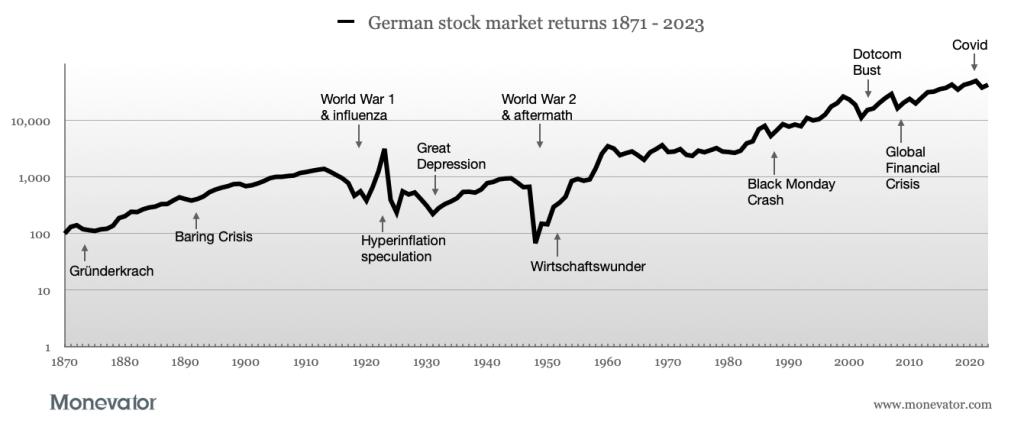
What caught my eye this week.
A new study from The Centre for Policy Research reckons the UK citizenry has £1.8 trillion (yes, that’s with a ‘t’) tucked away in cash and National Savings and Investments accounts.
That’s comparable to the total market capitalization of the entire UK stock market.
With inflation near-9% and even the best cash accounts still paying only 5-6%, cash is hardly a bankable strategy to solve all our savings needs. Especially when most of it won’t be earning anything like Best Buy interest rates.
What’s more, the implication that the British public could swap all their cash savings to become the collective owners of Great Britain PLC – as listed, anyway – is beguiling.
As a card-carrying capitalist, that’s the kind of taking back control I could get behind.
Opportunity cost
To quote from the report’s executive summary:
Britain’s neglect of retail investing is surprising in both practical and ideological terms.
In practical terms, incentivising more retail investors, and encouraging more retail investment, should increase the amount of deployable capital available across the UK economy. It should help individual companies achieve their full potential, support economic growth at a national level and, in turn and in time, reward those who have made those investments.
In a 2017 paper for the Centre for Policy Studies (CPS) on the retail bond market, Rishi Sunak pointed out that 55% of the US population was then invested in the stock market, vs just 19% of Britons. ‘That division,’ he said, ‘represents a vast store of underworked capital.’
Little has changed since then; recent statistics from UK Finance suggest that 10.6% of UK household financial assets are currently held in equity, compared to 36.2% of US households.
Moreover, thanks to modern technology and the growth of investment apps the barriers to entry are historically low – certainly when compared to buying property. The ideological arguments are equally strong. Retail investing can be rewarding on an individual level, in terms of self-actualisation and self-worth. But it also gives people an opportunity to shape the companies they invest in – to literally become an owner, which includes the right to vote on corporate pay, environmental issues and governance. More retail investment gives people a stake in the society and the economy of which they are part.
All music to my ears. Obviously we’re champions for long-term investing in equities and other assets, and for people taking charge of their own finances.
The report’s recommendation to scrap the distinction between cash and shares ISAs seems especially overdue.
And encouraging a stronger connection between people’s thinking about capitalism and the bounty we enjoy would be an almighty win.
I’ve long-lamented how so many prosper under our market system and free trade while simultaneously moaning about and decrying it – blaming corporations for everything rotten on the left, or turning to nationalism and protectionism on the right.
A true shareholder democracy could be run more for the many than the few(er).
Reality returns
However even as the site’s resident (naughty) active investor, I do wonder about some of the report’s other proposed solutions to getting more people invested.
Deliberately trying to involve more everyday punters in IPOs, say. Or curbing the risk disclaimers around investment products.
These things are only a panacea in an ideal world, where people do even half as much research about investing as they put into planning their holidays – and where the typical financial advisor is more like a doctor than an estate agent, or worse.
Two decades of writing and talking about investing at Monevator leads me to suspect that a dash for retail’s cash would cause as many problems for everyday investors as it would solve.
If we could get several million more people investing more in low-cost index funds then sure, that’d be great.
If millions more people learned about and followed a sensible path to financial independence, the only downside from my perspective would that this website would be out of a job.
But you hardly need to be Martin Scorsese to picture what directing £1.8 trillion in cash towards far-riskier assets gate-kept by a freshly-deregulated financial services sector could look like.
Not so much The Wolf of Wall Street as The Silencing of the Lambs.
Tell Sid to leave the fantasy stockpicking-for-all stuff back in the 1980s.
Have a great weekend!
From Monevator
The Slow and Steady Passive Portfolio update: Q2 2023 – Monevator
More rooting around in the rubble of the bond market crash – Monevator
From the archive-ator: Personal time management for fun and profit – Monevator
News
Note: Some links are Google search results – in PC/desktop view click through to read the article. Try privacy/incognito mode to avoid cookies. Consider subscribing to sites you visit a lot.
UK house prices post biggest annual drop since 2011, says Halifax – Reuters
70% of properties sold in Central London this year bought with cash – Guardian
‘Crippling duty hikes’ to raise prices for 90% of wines sold in UK – Yahoo Finance
Brian Winterflood, champion of small listed companies, 1937-2023 [Search result] – FT
Older workers who retired early in the pandemic were ‘forced into poverty’ – Guardian
Reviving the Imperial units push [On-brand for Brexit: total PITA and pointless] – Politics Home
Renewables go gangbusters, but the transition does also needs more nuclear – Gregor Letter
Products and services
Martin Lewis issues a deep fake scam alert, pretty unnerving [Video] – via Twitter
Which was the cheapest UK supermarket in June? – Which
Open a SIPP with Interactive Investor and pay no SIPP fee for six months. Terms apply – Interactive Investor
The odds of winning with Premium Bonds are now near a 15-year high – This Is Money
Amazon Prime: is it worth it? – Be Clever With Your Cash
The five cheapest cities in which to be a first-time buyer – Which
Open an account with low-cost platform InvestEngine via our link and get £25 when you invest at least £100 (T&Cs apply. Capital at risk) – InvestEngine
Why the first Bitcoin ETF that is approved will probably win – The Block
Former rectories in the UK for sale, in pictures – Guardian
Comment and opinion
Bond bull markets: lessons from the past [Search result] – FT
What’s your funded ratio? – Oblivious Investor
Numbers on a screen – The Belle Curve
Andrew Bailey versus the renters [Search result] – FT
Contrarians are usually wrong – A Wealth of Common Sense
The (Jimmy) Buffett portfolio – Fortunes & Frictions
There’s no magic pill for creating wealth – A Teachable Moment
Remembering the Japanese market’s multi-decade boom and bust – Econ Soapbox
Why I retired – Humble Dollar
Reflections on the inventor of modern portfolio theory – Morningstar
Understanding the modern monetary system [PDF] – Cullen Roche
Podcast mini-special
Do UK property prices really double every 10 years? [Podcast] – The Property Podcast
The spectrum of wealth [Podcast] – Morgan Housel
Key ingredients for a good retirement [Podcast] – Creative Planning
Andrew Lo on finding the perfect portfolio [Podcast] – Morningstar
Naughty corner: Active antics
Against Cassandras: on interest rate normalization – Klement on Investing
How to read an S-1 – Capital Gains
Guide to the markets: Q3 2023 [PDF] – JP Morgan
11 ways market cynics argue that any news is bad news – TKer
Building a fortress: finding companies with moats – Ensemble Capital
What do the best investors do that the rest don’t? – Behavioral Value Investor
Chart-watching market timers fail again… – Mathematical Investor
…and a bullish take from some chart-watching market timers – Carson Group
Kindle book bargains
The Ride of a Lifetime by Bob Iger – £0.99 on Kindle
How to Own the World by Andrew Craig – £0.99 on Kindle
Environmental factors
How bad is CO2? – Uncharted Territories
Learning to be an eco warrior, one step at a time – Guardian
Robot overlord roundup
AI and the automation of work – Benedict Evans
Off our beat
Don’t forget to swim now and then – Raptitude
Lessons from the catastrophic failure of the Metaverse – The Nation
An interview about ‘mimetic desire’ and why it matters – Investment Talk
Threads: let’s just call them tweets – The Verge
Sitcoms reveal culture that led to Brexit vote, says historian – Guardian
How to do great work [Long, was forwarded to me multiple times] – Paul Graham
And finally…
“Basically, when you get to my age, you’ll really measure your success in life by how many of the people you want to have love you actually do love you.”
– Warren Buffett, The Snowball
Like these links? Subscribe to get them every Friday. Note this article includes affiliate links, such as from Amazon and Interactive Investor.
The post Weekend reading: Getting Britain invested appeared first on Monevator.



